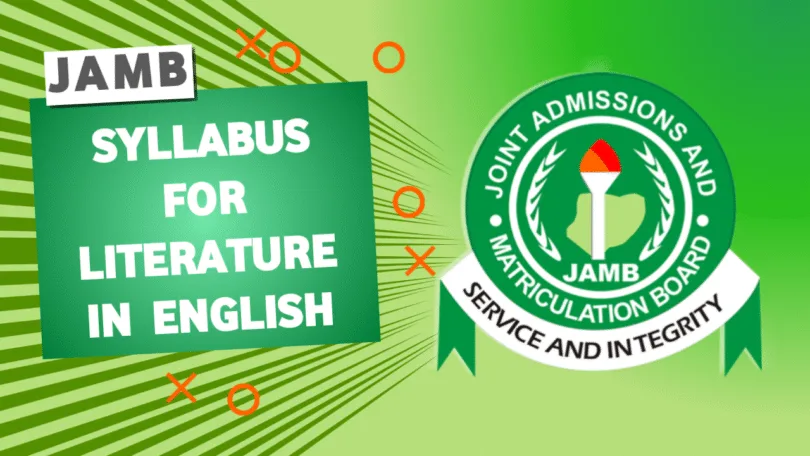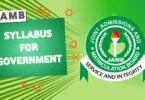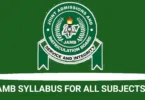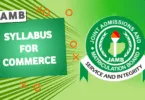The JAMB Syllabus for Literature-In-English is an essential guide for candidates preparing for the Unified Tertiary Matriculation Examination (UTME) in the 2026/2027 academic session. Crafted by the Joint Admissions and Matriculation Board (JAMB), this syllabus outlines critical topics, objectives, and recommended texts to help students excel in the Literature-In-English paper. By adhering to the Syllabus, candidates can streamline their preparation, focusing on relevant content and avoiding unnecessary materials.
The Literature-In-English section of JAMB evaluates candidates’ ability to appreciate literary works, analyze texts, and understand literary devices and themes. The Syllabus encourages a deep engagement with literature, fostering critical thinking skills that connect to social, political, and cultural issues. For the 2026/2027 session, the syllabus remains consistent with recent updates, emphasizing African and non-African prose, poetry, drama, and literary appreciation. Questions often draw directly from prescribed texts, making thorough study of these materials crucial.
Using the JAMB Syllabus for Literature-In-English ensures a structured study plan. It is divided into four key sections: prose, poetry, drama, and literary appreciation, each with specific objectives like identifying themes, analyzing characters, and evaluating stylistic features. The exam typically consists of 40 multiple-choice questions worth 40 marks, testing comprehension and analytical skills. High performance in Literature-In-English can enhance admission prospects for competitive courses such as English, Mass Communication, and Law.
The JAMB Syllabus for Literature-In-English also promotes an appreciation of cultural diversity through literature. It encourages candidates to explore African writers’ portrayals of societal challenges alongside global perspectives from non-African authors. By following this syllabus, students not only prepare for the exam but also cultivate a lasting appreciation for literature. The JAMB Syllabus for Literature-In-English confirms the use of harmonized texts valid through 2030, providing continuity in preparation materials.

JAMB Syllabus for Literature-In-English
Detailed Breakdown of the JAMB Syllabus for Literature-In-English
The JAMB Syllabus for Literature-In-English is organized into four main sections, each with clear objectives and subtopics. Candidates should aim for comprehensive coverage to maximize their performance.
Section A: Prose
This section focuses on narrative fiction, encompassing both African and non-African works. The JAMB Syllabus for Literature-In-English requires candidates to analyze plot, characterization, setting, and themes in selected novels. Key objectives include:
- Identifying major and minor characters and their roles in the story.
- Discussing central conflicts and their resolutions.
- Evaluating the use of language and narrative techniques.
For African Prose, candidates study Second Class Citizen by Buchi Emecheta, which explores themes of gender inequality, migration, and identity. In non-African Prose, Invisible Man by Ralph Ellison delves into issues of racism, identity, and social invisibility. The JAMB Syllabus for Literature-In-English emphasizes comparative analysis, such as examining how individual struggles against societal norms are portrayed in these texts.
Section B: Poetry
Poetry in the JAMB Syllabus for Literature-In-English tests candidates’ ability to appreciate form, imagery, and symbolism. Objectives include:
- Identifying poetic devices such as metaphor, simile, and personification.
- Interpreting themes like love, death, nature, or social justice.
- Analyzing structure, rhythm, and tone in poems.
African Poetry includes works by poets like Wole Soyinka (“Night”) and Niyi Osundare (“Not My Business”), which focus on socio-political commentary. Non-African selections feature poets such as William Shakespeare (Sonnet 18) and Alfred Tennyson (“Crossing the Bar”), emphasizing romantic and elegiac themes. The JAMB Syllabus for Literature-In-English recommends annotating poems to gain deeper insights into their meaning and structure.
Section C: Drama
The drama section of the JAMB Syllabus for Literature-In-English covers plays, requiring knowledge of dialogue, stage directions, and dramatic techniques. Key objectives are:
- Outlining plot structures and identifying tragic or comic elements.
- Assessing character development and motivations.
- Examining themes such as power, betrayal, and redemption.
For African Drama, The Lion and the Jewel by Wole Soyinka satirizes the clash between tradition and modernity. In non-African Drama, Look Back in Anger by John Osborne critiques post-war British society. The JAMB Syllabus for Literature-In-English emphasizes understanding dramatic techniques like irony and foreshadowing.
Section D: Literary Appreciation
This section focuses on literary criticism and principles, serving as a foundation for analyzing texts. Objectives include:
- Defining literary terms such as climax, flashback, and stream of consciousness.
- Applying critical principles to unseen texts.
- Relating literature to broader socio-economic and cultural contexts.
The JAMB Syllabus for Literature-In-English encourages candidates to demonstrate how literature reflects or critiques societal issues, enhancing their analytical skills.
Recommended Texts
The prescribed texts for the JAMB Syllabus for Literature-In-English 2026/2027 are drawn from harmonized lists for WASSCE and JAMB, valid through 2030. These texts are mandatory, as exam questions are based on them. For prose, candidates study Second Class Citizen by Buchi Emecheta (African) and Invisible Man by Ralph Ellison (non-African). Poetry includes African works like Wole Soyinka’s “Night” and Niyi Osundare’s “Not My Business,” alongside non-African poems such as Shakespeare’s Sonnet 18 and Tennyson’s “Crossing the Bar.” In drama, The Lion and the Jewel by Wole Soyinka (African) and Look Back in Anger by John Osborne (non-African) are required. These texts cover diverse themes, from gender and identity to tradition and social conflict.
Preparation Tips
To excel using the JAMB Syllabus for Literature-In-English, candidates should obtain the official JAMB brochure for the most accurate syllabus details. Read each prescribed text multiple times, noting key quotes, themes, and character analyses. Practice with past JAMB questions to become familiar with the computer-based test (CBT) format. Joining study groups can enhance understanding through discussions of themes and interpretations. Allocate study time strategically, such as two days weekly for prose, one for poetry, one for drama, and one for literary appreciation. Consistent effort aligned with the JAMB Syllabus for Literature-In-English is more effective than last-minute cramming.
READ ALSO: Latest JAMB Syllabus for All Subjects PDF for UTME 2026
FAQs
What is the main purpose of the JAMB Syllabus for Literature-In-English?
The JAMB Syllabus for Literature-In-English guides candidates on key topics, fostering appreciation and analytical skills for literary works.
How many questions are in the Literature-In-English section of JAMB?
The section typically includes 40 multiple-choice questions based on the JAMB Syllabus for Literature-In-English.
Are the prescribed texts in the JAMB Syllabus for Literature-In-English compulsory?
Yes, all texts listed in the JAMB Syllabus for Literature-In-English are mandatory, as questions are drawn directly from them.
Can I use old syllabi for JAMB 2026/2027 preparation?
While the JAMB Syllabus for Literature-In-English is generally consistent, always check for updates to prescribed texts for the 2026/2027 session.
How does the JAMB Syllabus for Literature-In-English help in scoring high?
Focusing on the JAMB Syllabus for Literature-In-English ensures candidates study exam-relevant content, improving accuracy and efficiency.
What happens if I skip a section of the JAMB Syllabus for Literature-In-English?
Skipping any section can lead to low scores, as the JAMB Syllabus for Literature-In-English requires balanced coverage for optimal performance.





